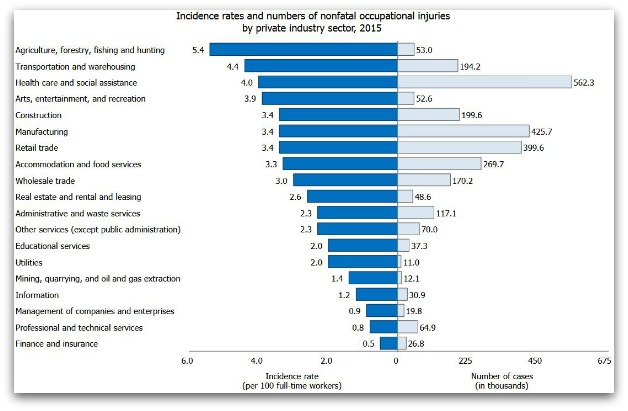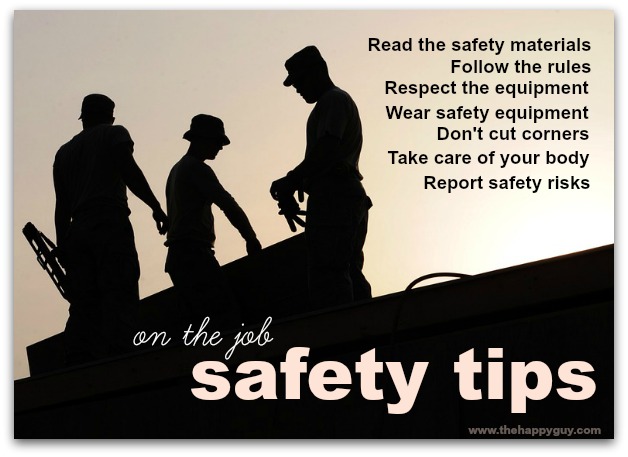Some jobs are more dangerous than others, but every life is precious. Here are the top job safety tips.
Life is dangerous, and so is work.
In the past six months, 255 people have died on the job in the United States.
In 2015, the last year with complete numbers, there were 2.9 million on-the-job injuries. That includes work-related illnesses, such as:
- poisoning
- hearing loss
- skin diseases
Illness mostly comes from healthcare and manufacturing. But illnesses, generally from chemicals or viruses, pale in comparison to actual injuries, such as cuts, pulled muscles and broken bones.
That’s a sobering reason to avoid going to work. Especially if you are in one of the top five sectors for injuries:
- health care
- manufacturing
- retail
- hospitality
- construction
Stop! Somebody help me out, please. How come there are twice as many injuries in retail trade – stores, as in construction? And twice as many in retail as in “transportation and warehousing)?
The truth is that “agriculture, forestry, fishing and hunting” is the most dangerous sector on a per-employee basis. Still, retail comes in 7 out of 19. So beware, store clerks!
On the plus side, death by retail is rare. Here are some typical descriptions of on the job fatalities:
- “Worker killed in fall from platform.”
- “Worker fatally crushed by granite slabs.”
- “Worker struck and killed by truck.”
- “Worker fatally crushed between two port cars.”
- “Worker killed in fall from roof.”
- “Worker struck and killed by pipe.”
A lot of falling and getting hit. Not how I would want to end my work day.
If you are a new employee, there is even worse news. In your first month on the job, you are three times as likely to get injured than your colleagues of over a year.
Yikes!
If you are new on the job, what can you do about it. Juan Reyna is a personal injury attorney. He’s seen it all, which I suppose is an occupational hazard of his job. Here are his top tips to avoid the most serious injuries:
Read the safety materials
Companies are required by law to give safety instructions whenever sending people into dangerous zones. Obviously that includes operating heavy equipment or working around heavy equipment. It also includes working on a constructions site or anywhere that chemicals or bacteria are present.
Some companies are very diligent to make sure you have complete training. Others just throw the manual at you and in some cases make you do a short quiz.
It is in your interest to read the material very, very carefully. As you can tell by the statistics, it is not a good idea to wait a few months to “get around to it”.
Follow the rules
Nobody ever saved their lives by reading alone. Nor by passing a quiz, not even with a 100 percent mark. You have to follow the rules and the guidelines.
Respect the equipment
That doesn’t just mean to keep out of the way of a moving truck. It also means to make sure the equipment is working properly. If it’s not, get it repaired. Don’t use jerryrigged equipment. Here is a fine example of a tragedy just begging to happen:
“The latch had been bent to keep the electrical panel door working. This was in a wet area, with a pregnant employee working the machine.”
Wear safety equipment
It you are working around heavy equipment, hard hats, thick gloves and steel-toed boots are a must. You need safety harnesses at heights. In medical areas, gloves and face masks and lots of disinfectants are needed.
Don’t cut corners
Falls remain one of the most common causes of on-the-job death. Many falls can be prevented just by waiting for another pair of hands or another piece of equipment, rather than trying to do it all yourself.
Most injuries and illnesses are the result, at least in part, of somebody cutting corners. Whether it is jerryrigging equipment rather than calling for repair or doing “just this one” without gloves on, cutting corners can be dangerous.
Take care of your body
A lot of injuries come from hurting your back or neck, or pulling a muscle.
- Watch you posture.
- Lift with your knees.
- Take breaks to rest up.
Report safety risks
If you see an unsafe situation, report it. It’s your safety, and your coworkers’ safety, too. And its your right. Best to report it in writing and save a copy. If ever you hurt yourself, it can be costly in more ways than just pain or disability. That written report is your proof that your employer was made aware of the risk.
A $37.1 million settlement might help ease the pain, but it won’t replace Logan Milstead’s crushed leg. The company was found negligent in the case. Don’t wait for that to happen to you; report anything that might be dangerous.
Sad, sad, sad to see so many people hurt on the job. Sometimes, there is nothing you can do. Accidents happen; that’s why they are called accidents. But many “accidents” can be prevented, and you owe it to yourself to do the best you can to prevent them.





Thanks for the useful tips. A friend of mine also had a labor accident half a year ago, I am very sad about that. I think everyone should be conscious of safety for themselves.
Hi David,
So sad to hear 255 people died on the job. Our healthy body helps us till the end of life so we should take care of it for happy life’s journey. Here is the best material to keep yourself safe and secure. Taking care of your body is very important for everyone. There are many technical companies where you must follow the rules during the work to keep yourself safe and neglecting them, may cause your health.
During work, wearing safety equipment properly is necessary to everyone. Hard hats and steel toed boots best to keep you safe. Unsafe situations are made to be report, so do not hesitate to report.
Also, do not put yourself in danger and avoid unsafe work.
Thanks for the awesome job safety tips, David.
With best wishes.
– Ravi.
Hi David,
Thanks a lot for sharing this. You have written most important safety tips for the workplace. But, in my opinion there are two major factors that have significant effect to workplace safety. They are commitment from the top management and worker awareness against safety.
If these two factors function well, hazard safety can be controlled well too.
Safety Equipment plays an important role in safety but many people overlook it and they have to face consequences for the same.
Thanks for the article. Really helpful.
Everyone should wear safety equipment during the work otherwise you can face a danger problem…Brilliant article and one of the most informative about job safety guides I’ve ever read.
In all kinds of job there is a risk, a disadvantage either in your health or your co-worker..we just have to be careful and cautious…